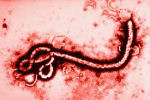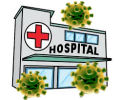
I recently received a message from one of those petition organisations, which advocated sending Australian volunteers to Ebola stricken countries. I used to be an infection control nurse union rep in a detox at the time when HIV and various more infective new hepatitis bugs were becoming too obvious to ignore. Although I have not worked in the field for a year, the messages I am getting from the media and other contacts lead me to think that the problems of infection control I discuss below continue in our health-care and lay community. Chief among them are a confusion between virocides (which kill viruses) and a motley series of bacteriocides (which kill selected bacteria). I welcome comment and discussion and apologise to health professionals out there who I may have underestimated. I have written this article because I am a bit worried.
Whilst I applaud the suggestion of sending medical and nursing volunteers, I cannot support them without additional recommendations:
- that countries sending volunteers do this in dedicated airlines and other transport that will be subject to rigorous infection control
- that countries sending these volunteers stringently quarantine them for adequate number of weeks upon their return
Otherwise, what you are recommending will only fuel a global pandemic.
Since nations are unwilling to stop global population movement during this time for short-term economic reasons, despite the growing risk it poses to the world, another approach is necessary to cut down transport risks.
The substitution of dedicated transport with special disinfection and quarantine liaison to and from countries where the epidemic has already been identified or suspected is one way we can decrease the risks.
All international transport carrying passengers needs to be subject to stringent disinfection procedures.
Contagiousness of Ebola
I think the main problem for the general public with ebola is it being passed on by fomites - e.g. inanimate objects like doorknobs, knives, forks, glasses, toilet paper dispensers. This is because when people have diarrhoea and vomiting, or are feeling really ill, they are not capable of cleaning their hands and faces. They handle taps and doorknobs. Others then handle those and touch their noses and faces. Either because of the virulence of the virus, or because of the density of number of the viral organisms in infected tissues and fluids, if those people go on to touch their faces - which people do constantly - they will easily pick up the virus via their mucous membranes - mouth, nostrils, eyes. The World Health Organisation talks about avoiding touching what ebola carriers have touched. http://apps.who.int/iris/bitstream/10665/132168/1/WHO_EVD_Guidance_TravelTransportRisk_14.1_eng.pdf?ua=1
The document says, among other things:
"Person -to - person transmission by means of direct contact with infected, symptomatic persons or their body fluids/secretions is the principal mode of transmission. Airborne transmission has not been documented." (My emphasis)
and
"contact with used needles and any used objects that may have been contaminated by an Ebola -infected person or dead body, even if no blood or body fluid is visible." (My emphasis)
The flu is mostly passed on via the same method, but the main agent of contamination is coughing, sneezing and dripping noses etc where the droplets drift down onto surfaces, which other people touch. It does not sound as if ebola involves coughing and sneezing much. With ebola, it would be vomitus, faeces (bloody urine) and bloody flesh particles (such as the surface of the tongue which sloughs off).
In another WHO document (aimed at health care workers, but why not anyone?) WHO also refers to both inanimate objects (fomites) and to the need for face-masks (presumably for various kinds of sprays, splashes and unexpected contact):
"Health-care workers caring for patients with suspected or confirmed Ebola virus should apply extra infection control measures to prevent contact with the patient’s blood and body fluids and contaminated surfaces or materials such as clothing and bedding. When in close contact (within 1 metre) of patients with EBV, health-care workers should wear face protection (a face shield or a medical mask and goggles), a clean, non-sterile long-sleeved gown, and gloves (sterile gloves for some procedures)." http://www.who.int/mediacentre/factsheets/fs103/en/
Viral 'load' (density of organism) and its toxicity)
With some infections (like HIV) you need a lot of viral material (i.e. lots of individual virus particles) to swamp human immune defenses. With most kinds of hepatitis, much less. With colds and viral gastro, hardly any. I'm not sure what the requirements are for ebola, but it sounds as if it is less infective than flu virus which requires very few individual organisms to infect, however you would get a lot of ebola organisms at a time so it would be very infective in that way. Here is http://jvi.asm.org/content/78/19/10370.fulla full article on the viral load of Ebola in sick people.
I don't understand why the WHO literature etc is not more detailed on these subjects.
Virocides and bacteriocides
Whilst soap and alcohol handwashes (with over 60% alcohol and used effectively) are good ways to reduce infective organisms on your skin these won't keep your immediate environment safe.
In my own professional experience (as an RN) a lot of health professionals have shown little awareness of the importance of disinfecting with virocides for viruses, as opposed to bacteriocides, which only kill (selected according to agent) bacteria. With every disinfectant you need to get to know its properties and follow instructions closely.
The main virocides are sodium hypochlorite (bleach) and glutaraldehyde. Glutaraldehyde is used for sterilising instruments in surgery. The bleach has to be at high strength and fresh; it loses its effectiveness over a short time and new solutions need to be prepared daily. This fact sheet gives strengths, combinations and longevity. Bleach works by dissolving protein (which is why you don't want to get it for long on your skin or up your nostrils. In my experience, it is common for hospital and other health professionals to mistakenly use non-virocidal disinfectants of all kinds or, to save on money, lesser strength solutions, or solutions that are past their storage date. In my opinion, communities need rigorous re-training in this matter. A number of factors in the 'developed' world may have caused a loss of interest, respect for and expertise in practical disinfection. Among these would be:
- The availability of antibiotics and of vaccinations against once familiar diseases in the 'developed world',
- The use of disposable instrument and bandage packs, instead of all wards carrying out their own disinfection
- The use of special hospital units for disinfecting and preparing sterile packs
- The use of cleaners (of lower status than nurses) to clean wards, meaning that they receive less serious training and are taken less seriously and often have inferior materials
- Territorial issues: Although nurses are usually meant to attend to proteinacious 'spills' (human fluids, especially blood, faeces, vomit) they may try to leave this to the cleaning staff. Depending on how often they encounter such 'spills' they may be more or less familiar with the disinfectant materials available, concentrations, shelf-life. Sometimes they may not be able to get at these materials because the cleaners are the ones that have the keys.
(As mentioned, I used to be an infection control rep for a small detox in the 1980s when HIV and various unusual hepatitises were starting to become a problem. I discovered that almost no-one knew how to deal with them, so I got some disinfectant manufacturers in to lecture us).
One way to interest health-care staff in disinfection skills is to take advantage of an infection crisis. If the risk dies right back, they will lose interest again, because of the other methods (antibiotics, disposable equipment etc) tend to keep more familiar infections at bay in normal times. So infection control is a skill that needs to be beefed up every time there is a crisis, in my opinon. Furthermore, the general public needs to know a lot about it as well, for cooperation and self-care. The community should be actively engaged, and not get the impression that this is a matter for professionals alone.
Another thing that will make a difference from population to population is what immunity they might accidentally already have plus their state of health and nutrition, however this virus sounds as if it is very dangerous to all or most populations
I think that the leaders of 'first world' countries are very complacent because they believe that our civilisations are somehow better equipped to deal with this and they are expecting vaccines to be invented, and have not considered the logistics of dispensing these to hundreds of millions of people, even if they were effective against Ebola and freely available in sufficient quantities.

 With everything that’s happening about the Coronavirus, it might be very hard to make a decision of what to do today. Should you wait for more information? Do something today? What?
With everything that’s happening about the Coronavirus, it might be very hard to make a decision of what to do today. Should you wait for more information? Do something today? What?
 I recently received a message from one of those petition organisations, which advocated sending Australian volunteers to Ebola stricken countries. I used to be an infection control nurse union rep in a detox at the time when HIV and various more infective new hepatitis bugs were becoming too obvious to ignore. Although I have not worked in the field for a year, the messages I am getting from the media and other contacts lead me to think that the problems of infection control I discuss below continue in our health-care and lay community. Chief among them are a confusion between virocides (which kill viruses) and a motley series of bacteriocides (which kill selected bacteria). I welcome comment and discussion and apologise to health professionals out there who I may have underestimated. I have written this article because I am a bit worried.
I recently received a message from one of those petition organisations, which advocated sending Australian volunteers to Ebola stricken countries. I used to be an infection control nurse union rep in a detox at the time when HIV and various more infective new hepatitis bugs were becoming too obvious to ignore. Although I have not worked in the field for a year, the messages I am getting from the media and other contacts lead me to think that the problems of infection control I discuss below continue in our health-care and lay community. Chief among them are a confusion between virocides (which kill viruses) and a motley series of bacteriocides (which kill selected bacteria). I welcome comment and discussion and apologise to health professionals out there who I may have underestimated. I have written this article because I am a bit worried.
Recent comments